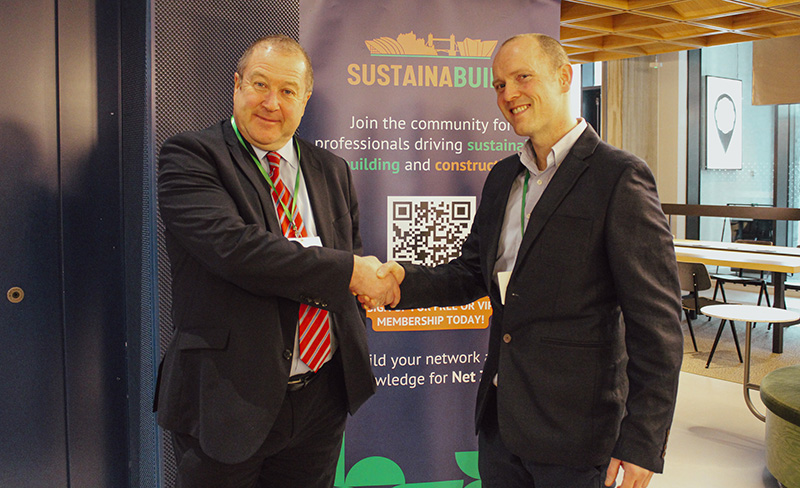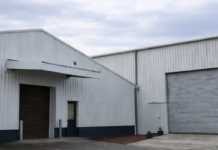
CONSTRUCTION leaders from across Scotland have called for industry-wide collaboration to address the nation’s ‘green skills’ gap.
A recent gathering at Sustainabuild Assembly, a networking event focused on driving sustainability within the built environment and construction sector, saw leaders issue a rallying cry for the industry to work together at every level to ensure the workforce is green skills ready.
The event at the Social Hub, Glasgow, was opened by MSP Graeme Dey, minister for higher and further education. In his address, he highlighted the contribution the construction and built environment made to the Scottish economy, adding that the proportion of green jobs advertised in Scotland was significantly higher than the UK average (5.6% versus 3.3%).
Across the UK, it is estimated there is a current gap of around 200,000 green skill workers, with 56% of Scottish organisations highlighting a worrying shortage of skills generally, coupled with a lack of skilled ‘green collar’ construction workers, according to a recent report by Turner & Townsend.
Reflecting on the event, Graeme Dey said, “Scotland is already leading the way in delivering a green jobs revolution. Our colleges and universities are playing a pivotal role in developing a world-class skills system and government-funded initiatives, such as the Energy Skills Partnership (ESP) and BE-ST, are actively supporting education institutions in meeting industry’s need for high-quality, lifelong and green jobs.
“While we recognise that Scotland is on a good trajectory, it is clear that more needs to be done to accelerate the just transition to net zero. As part of this, it is crucial that businesses can foster strong relationships with the education system to ensure that Scotland has the workforce it needs for a future green economy.
“It was welcome to engage with industry leaders on this at the first Sustainabuild Assembly event. The genuine enthusiasm and expertise I saw makes me hopeful that, collectively, we can successfully address the challenges in the built environment sector and prepare Scotland for the future.”
During the Assembly, more than 50 delegates discussed the key issues and barriers faced by the industry and beyond. These included the need for training and education to ensure future generations are taught contemporary methods of construction in order to build more sustainably.
Attendees also concluded that green skills – often considered an add-on subject – needed to form the basis of all learning programmes, and from a younger age where possible.
Parental attitude was also highlighted as a barrier, with university still generally considered the preferred career route rather than apprenticeship courses and more hands-on learning programmes.
Steven Kiakowski, director of The Verdancy Group, a company that provides sustainability training and environmental guidance, commented, “Collaboration between industry, education, and the third sector is vital to closing the green skills gap. By working together to develop and deliver impactful training and upskilling programmes, we can drive innovation, ensure job readiness, and empower communities to support the shift towards a low-carbon, sustainable economy.”
Matt Colgan, director of Sustainabuild, added, “So much brilliant work is being done, but sadly there is still so much that is stopping the country meeting the skills required to deliver greener buildings, homes and infrastructure. Firstly, we have an aging workforce in construction and building, and with this is a lack of understanding of modern methods of construction, which naturally lends itself to being more sustainable. Therefore, training and upskilling the existing work force is absolutely essential.
“Secondly, we must promote the benefits of a career in building to our younger generations – especially those who are less keen to pursue an academic route. As one of our speakers said, a career in building doesn’t need to look like wearing a yellow vest and rolling about in the mud, in fact many successful highly paid directors of construction companies started their career as an apprentice.
“Young people today are much more likely to get a higher salary by looking at a career in the built environment – and those with green skills will be even more in demand. This is a message that really needs to hit home.”
Delegates pointed to the need for urgent collaboration if Scotland was to meet its net zero target.
Speaking after the event, Jim Johnstone, head of communities & social impact at Morrison Construction, said, “It seemed to me that everyone who attended the event was calling for the same thing – the urgent need for collaboration to tackle the desperate shortage of green skills in the built environment. This collaboration needs to come from all areas: from industry to educators, parents to politicians. We need to ask ourselves – what is stopping this change? We need leadership. We need action. We need a cohesive plan that will drive this pressing issue forward – and find solutions.”
Caryn Gibson, business operations manager at Timber Engineering, added, “We believe the true magic happens when academia and industry work together. Industry will advance quicker than academia ever can and so we have a responsibility to keep our education institutions up to date with what is happening in our sectors so they can adapt their teaching.
“I believe you get the best out of people with a combination of both practical and theory-based learning and so we have to open our doors and offer that practical, hands-on learning experience. Right now, we have our highest unemployment figures and businesses growth is being stagnated due to labour shortages and part of the problem is misalignment with skills and the lack of understanding of the careers that exist. Its only by working together we can start to solve this problem.”
Following the first Sustainabuild Assembly, an impact report is being prepared to examine ideas and inspiration suggested by the separate breakout groups. For a copy of this report, sign up for free membership to Sustainabuild here








